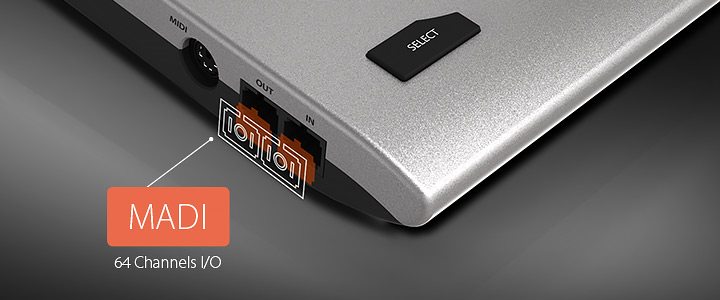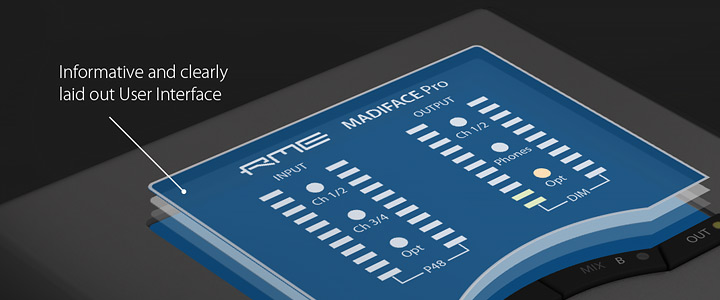MADI & AES/EBU Series
- Overview
- HDSPe MADI FX
- HDSPe MADI
- HDSPe AES
- MADIface XT
- MADIface USB
- MADIface Pro
- M-32 / M-16 AD
- M-32 / M-16 DA
- M-32 Pro
- ADI-642
- ADI-6432/ADI-6432R
- ADI-6432R BNC
- ADI-648
- MADI Router
- MADI Converter
MADI Info Center
RME MADIface Pro
Overview
Connectivity
• Record/Playback channels: 68 in / 68 out
• 4 x Analog Inputs (Mic, Line, Instrument)
• 4 x Analog Outputs (2 x XLR, 2 x Phones)
• 1 x MADI I/O
• 1 x MIDI I/O plus MIDI over MADI
• 1 x USB 2.0 (USB 3 compatible)
• Separate outputs for
high and low impedance headphones
Taking 8 Channels to 64 Channels
In 2015 the RME Babyface Pro was launched to much industry acclaim. Now regarded as the new standard in high-end desktop recording, it’s superior sound, build quality and professional connectivity has made it the first choice for producers, engineers and artists everywhere.
One year on, and RME have taken the Babyface Pro to the next level. The MADIface Pro retains the beautifully designed housing with its integrated XLR and analog I/Os, but has replaced the ADAT I/O with a MADI port. The result is 64 channels of pristine audio on a single cable on an interface that will fit in your laptop bag with your computer.
Because of its physical design and versatile I/O, the MADIface Pro is the perfect mobile solution where quality audio is critical. As well as remote, live, broadcast and industrial applications, the MADIface Pro is also the complete solution for the studio.
Basic Functionality
Two analog mic/line XLR inputs, two XLR line outputs, two universal TS inputs for line or instrument, and 2 stereo TRS outputs for low and high impedance headphones provide everything you need to work on your projects in the studio or on the move. TotalMix FX adds 3-band parametric EQs and reverb/ echo, plus unlimited mixing and routing options. A MIDI I/O completes the fully DAW compatible feature set. The unit operates USB bus powered and usually does not need an external power supply, unless the MADI I/O is used.
MADI I/O
The optical MADI I/O offers 64 input and out channels, and sample rates up to 192 kHz. It is fully supported in TotalMix FX, with the analog I/Os simultaneously available, resulting in 68 channels input and 68 channels output over USB 2.
To address the increased power demand, RME has implemented a delayed start of the MADI transceiver on power-up, and an option to temporarily disable it when not needed. The MADIface Pro includes an external power supply with lockable connector.

Stand-Alone Mode
When not connected to a computer, the MADIface Pro enters stand-alone mode. The easy to use control surface with dedicated buttons and four level meter bars, along with independent storage of all current settings have already become important workflow features for many existing Babyface Pro owners.
A very useful MADI monitor feature has been added to stand-alone mode. MADI channels 1 to 64 are passed unchanged from input to output (but refreshed by the MADIface Pro SteadyClock III). Optionally channels 1/2 can be replaced by the input signals 1/2, 3/4, MADI 1/2 or a user adjustable mixdown of all these channels. The analog outputs can be used to listen to any incoming MADI channel pair.

RME USB 2.0
It’s RME’s ability to deliver professional performance over USB 2.0 that allows the MADIface Pro to record and playback 68 simultaneous channels, all with buffer sizes as low as 32 samples (lowest value depends on computer used). The MADIface Pro can be used in Class Compliant mode achieving 24 channels of I/O (4 analog, 20 channels MADI) on an iPad™. This truly professional and mobile solution can be easily set and controlled via RME’s optional iOS app TotalMix FX for iPad™, available in the App Store.
Technical Specifications
Analog
AD, Microphone/Line 1-2
• Input: XLR, electronically balanced
• Input impedance balanced: 2 kOhm, 5.2 kOhm with PAD
• Input impedance unbalanced: 1 kOhm, 2.6 kOhm with PAD
• Signal to Noise ratio (SNR): 113 dB RMS unweighted, 116 dBA
• Frequency response @ 44.1 kHz, -0.1 dB: 18 Hz – 20.8 kHz
• Frequency response @ 96 kHz, -0.5 dB: 7 Hz – 45.8 kHz
• Frequency response @ 192 kHz, -1 dB: 5 Hz – 92 kHz
• With PAD active : -0.1 dB 8 Hz, -0.5 dB < 4 Hz, -1 dB < 3 Hz
• THD: < -110 dB, < 0.00032 %
• THD+N: < -104 dB, < 0.00063 %
• THD @ 30 dB Gain: < -107 dB, < 0.0004 %
• THD+N @ 30 dB Gain: < -100 dB, < 0.001 %
• Channel separation: > 110 dB
• Gain range: -11 dB up to +65 dB
• Maximum input level XLR, Gain 0 dB: +8 dBu, PAD +19 dBu
• Maximum input level XLR, Gain 65 dB: -57 dBu, PAD -46 dBu
AD, Line/Instrument In 3-4
As Microphone/Line 1-2, but:
• Input: 6.3 mm TS jack, unbalanced
• Input impedance: 470 kOhm
• Signal to Noise ratio (SNR): 114 dB RMS unweighted, 117 dBA
• Frequency response @ 44.1 kHz, -0.1 dB: 5 Hz – 20.8 kHz
• Frequency response @ 96 kHz, -0.5 dB: < 3 Hz – 45.8 kHz
• Frequency response @ 192 kHz, -1 dB: < 2 Hz – 92 kHz
• Maximum input level @+4 dBu, Gain 0 dB: +13 dBu
• Maximum input level @-10 dBV, Gain 9 dB: -5 dBu
DA, Line Out 1-2
• Dynamic range (DR): 115 dB RMS unweighted, 118 dBA
• Frequency response @ 44.1 kHz, -0.5 dB: 0 Hz – 20.8 kHz
• Frequency response @ 96 kHz, -0.5 dB: 0 Hz – 45 kHz
• Frequency response @ 192 kHz, -1 dB: 0 Hz - 89 kHz
• THD: - 106 dB, 0.0005 %
• THD+N: -102 dB, 0.0008 %
• Channel separation: > 110 dB
• Output: XLR balanced
• Output impedance: 300 Ohm balanced, 150 Ohm unbalanced
• Output level @ 0 dBFS: Balanced +19 dBu, unbalanced +13 dBu
• DC @ 0 dBFS: 6.35mm 4.8 V, 3.5mm 2.4 V, XLR bal. 9.6 V
DA, Phones 3/4
As DA Line Out, but:
• Output: 6.3 mm TRS jack, unbalanced
• Output impedance: 10 Ohm
• Output level at 0 dBFS, 1 kOhm load: +13 dBu
• Max power @ 0.1% THD: 50 mW
• Output: 3.5 mm TRS jack, unbalanced
• Output impedance: 2 Ohm
• Output level at 0 dBFS, 1 kOhm load: +7 dBu
• Max power @ 0.1% THD: 70 mW
MIDI
• 1 x MIDI I/O via breakout cable with 2 x 5-pin DIN jacks
• Galvanically isolated by optocoupled input
• 1 x MIDI I/O via MADI
• Invisible transmission via User bit of channel 56 (up to 48 kHz)
• Invisible transmission via User bit of channel 28 (up to 96 kHz)
• Hi-speed mode: Jitter and response time typically below 1 ms
• Separate 128 byte FIFOs for input and output
Digital
• Clocks: Internal, MADI In
• Low Jitter Design: < 1 ns in PLL mode, all inputs
• Internal clock: 800 ps Jitter, Random Spread Spectrum
• Jitter suppression of external clocks: > 50 dB (2.4 kHz)
• Effective clock jitter influence on AD and DA conversion: near zero
• PLL ensures zero dropout, even at more than 100 ns jitter
• Supported sample rates: 28 kHz up to 200 kHz
Digital Input
MADI
• Optical via FDDI duplex SC connector
• 62.5/125 and 50/125 compatible
• Accepts 56 channel and 64 channel mode, plus 96k Frame
• Standard: up to 64 channels 24 bit 48 kHz
• S/MUX: up to 32 channels 24 bit 96 kHz
• S/MUX4: up to 16 channels 24 bit 192 kHz
• Lock range: 25 kHz – 54 kHz
• Jitter when synced to input signal: < 1 ns
Digital Output
MADI
• Optical via FDDI duplex SC connector
• 62.5/125 and 50/125 compatible
• Cable length: up to 2000 m
• Generates 56 channel and 64 channel mode, plus 96k Frame
• Standard: up to 64 channels 24 bit 48 kHz
• S/MUX / 96k Frame: up to 32 channels 24 bit 96 kHz
• S/MUX4: up to 16 channels 24 bit 192 kHz
General
• Power supply: USB bus power or external power supply
• Idle power consumption: 3.1 Watts MADI Off, 4.0 Watts MADI On
• Max. power consumption: 6.3 Watts
• Current at 5 V bus power operation: 620 mA (3.1 Watts)
• Current at 12 V external power: 266 mA (3.1 Watts)
• Dimensions (WxHxD): 108 x 35 x 181 mm (4.25" x 1.4" x 7.1")
• Weight: 680 g ( 1.5 lbs)
• Temperature range: +5° up to +50° Celsius (41° F up to 122°F)
• Relative humidity: < 75%, non condensing
Optional Accessories
MADI1S: MADI Optical Network Cable, 1 m
MADI3D: MADI Optical Network Cable, 3 m
MADI6D: MADI Optical Network Cable, 6 m
MADI10D: MADI Optical Network Cable, 10 m
MADI20D: MADI Optical Network Cable, 20 m




